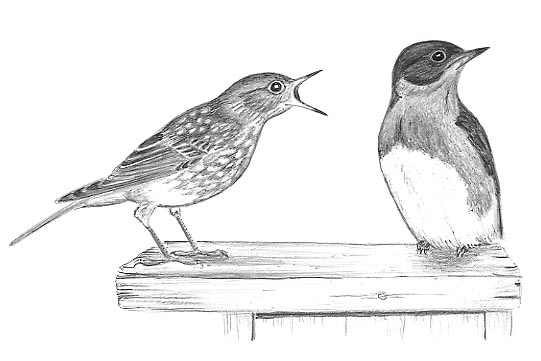
Dear Bird Folks,
We had a pair of bluebirds nest in one of our boxes, raise a brood and then go on their way. Now the pair is back, prepping a box for another go-round. We frequently see the male and/or female sitting on top of the box along with an immature from the earlier brood. Do the parent birds have overlapping familial duties, like tending to fledglings, while getting ready for a new clutch?
Stan, Brewster, MA
Be careful Stan,
That’s great about your bluebirds having multiple clutches, but I hope you realize how many people hate you right now. I know folks who would sell their lips just to see a bluebird, let alone have them nesting in their yard. And you are getting them to nest twice! That’s good news and everything, but you just might want to keep the news quiet or you may end up with a yard full of lip-less people trying to bird-nap your bluebirds.
Many songbirds have to wait for the leaves to come out on the trees and shrubs before they can build their nests. Without the protection of the foliage, their nests would be exposed to predators and bad weather. Bluebirds on the other hand, as most people know, are cavity nesters. They nest in old woodpecker holes or manmade birdhouses. Thus they don’t have to wait for things to begin blooming before they can get started with their “familial duties.” (Whatever that means.) Bluebirds may be sitting on eggs as early as late March or early April. Because they get started earlier, bluebirds have time for a second brood, or as you so sweetly put it, Stan, “another go-round.”
Having another go-round is a lot of work for bluebirds. Some baby birds, such as young game birds, waterfowl and shorebirds are “precocial,” meaning they are able to find food and feed themselves soon after they bust out of the egg. Songbirds are more like human babies, helpless, noisy and demanding from the moment they arrive. For several weeks they must be constantly fed while they grow. Even after they are able to fly it takes lots of learning and practice before they are able to reliably feed themselves. In the meantime they follow their parents around squawking and begging, hoping that their mother or father will shut them up by shoving a fresh grasshopper into their mouth. I think the birds know what they are doing. Force feeding grasshoppers is a very effective parenting skill that has worked well for me for years.
Bluebirds are very good parents, but even good parents have their limits. There is only so much begging they can take. Once the second batch of baby birds arrives, the cuteness of their first little beggars gets old fast. Most of the time the adults simply ignore the fledglings’ cries for food. The kids may then move away from their parents’ territory or they may continue to beg. If they continue to beg the parents will move aggressively towards their own offspring. The parental aggression should force the young birds to move away, but in some instances the kids report their parents to the department of social services and the whole thing ends up in court.
It may seem a bit cruel for the parents to push away their young birds, but it is really for their own good. A new territory will usually have a more abundant bug supply, which will make it easier for the inexperienced birds to find food. Also, by forcing the kids to move away, there is less of a chance of inbreeding. Inbreeding may not only hurt the species’ genetic diversity, but it may cause the birds to move out of their regular habitat and into double-wide trailers.
The second brood of bluebirds has one advantage over the first brood. Since the parents have finished nesting for the season, they are able to spend more time feeding this last batch of kids and aren’t in a hurry to push them away. The down side of being last is that there is far less time to learn foraging skills before the bad weather arrives. The first winter takes a heavy toll on many young bluebirds.
For the most part, Stan, there is a bit of overlap between caring for the two broods, (aka familial duties). It’s the male’s job to keep the first brood fat and happy, by shoving grasshoppers into their mouths, while the female sits on the eggs of the second brood. However, once the second batch hatches both adults give their attention to the new nestlings and the first brood must figure things out for themselves. Occasionally the older fledglings will become so good at finding food that they actually bring food to the new nestlings. This concept of food sharing would never go over at my house. The only thing that my kids have ever shared with each other is a case of the chicken pox and the occasional grasshopper.